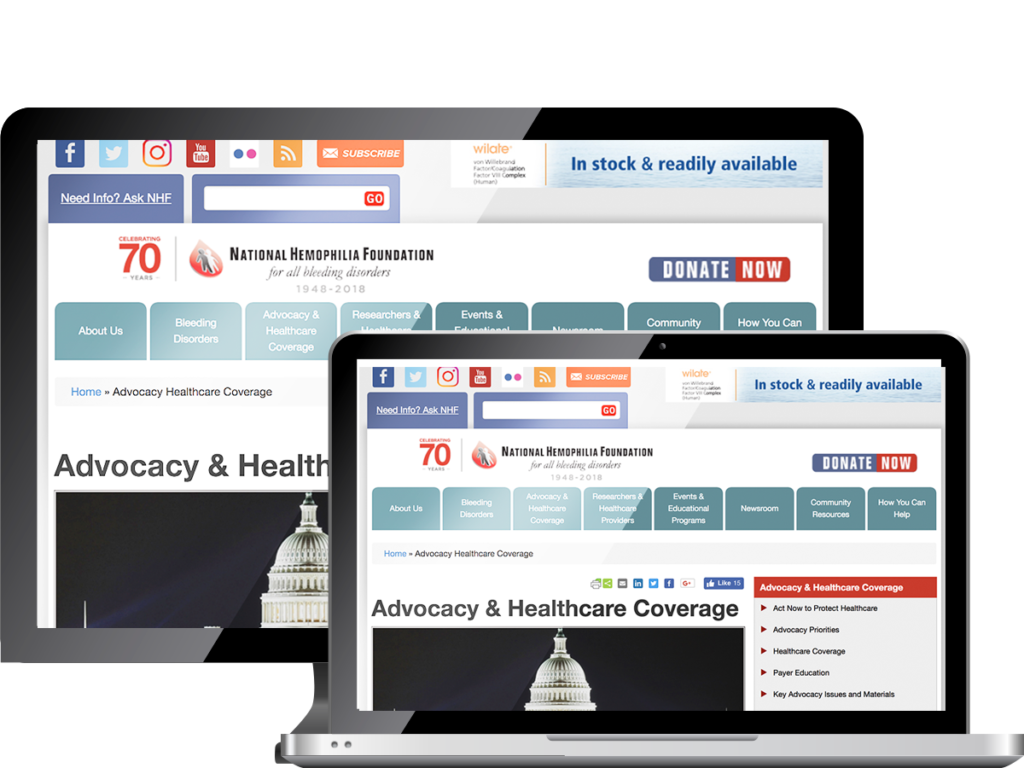Advocacy
HFM works to increase and maintain access to lifesaving medication and quality and affordable healthcare for bleeding disorder patients in the state of Michigan.
HFM ADVOCATES FOR PATIENTS
HFM works to increase and maintain access to lifesaving medication and quality and affordable healthcare for bleeding disorder patients in the state of Michigan.
Step therapy is an insurance cost-saving strategy enacted by private health plans and private Medicare drug plans. Before a plan will cover some (generally more expensive) drugs, they require you to try other (generally less expensive) drugs that also treat the condition. Sometimes referred to as “fail-first” policies, patients must fail on these cheaper or preferred medications, before their insurer will cover their doctor prescribed medication. The bleeding disorders community maintains that step therapy should not be used when prescribing clotting factor. Biologics products are not therapeutically equivalent and should be prescribed by hemophilia-specialists who have a strong relationship with their patients.
For bleeding disorder patients, the consequences of a treatment “failure” are extremely serious. The risks of a major bleed, or of cumulative damage from repeated bleeds, are too high to expose hemophilia patients to potentially ineffective treatments, or to delay their access to the therapies prescribed by their doctors.
HFM is working closely with the American Autoimmune Related Disease Association to share information and resources with patients and doctors. To learn more about this step therapy initiative, visit www.letmidoctorsdecide.org.
Children’s Special Health Care Services (CSHCS) is a program within the Michigan Department of Health and Human Services, administered under Title V of the Federal Social Security Act. It was created to find, diagnose, and treat children and some adults in Michigan with chronic health care needs. CSHCS is committed to removing barriers to appropriate health care and may be able to help with paying specialty medical bills, covering insurance co-pays and deductibles for private insurance, helping families to keep private insurance, and addressing transportation needs for medical care.
CSHCS covers people under the age of 21 with a qualifying medical condition. However, the age limitation is waived for patients with certain blood clotting disorders (hemophilia and other bleeding disorders) and cystic fibrosis. Families of all incomes are eligible to join, including those with other health insurance including Medicaid–though there may be a yearly fee to join CSHCS based on family income and family size. Visit www.michigan.gov/cshcs or call the CSHCS Family Phone Line at 800-359-3722 for more information.
CSHCS’s funding can change yearly. The program is funded through a combination of federal (Title XIX and Title V) funds, as well as state general funds. While Title V funds are capped, state general funding levels may vary based on the state budgetary needs. Additionally, language providing adult coverage must be maintained in the annual appropriations bill each year to ensure access for our adult population. In 2005, the Granholm Administration proposed eliminating coverage for cystic fibrosis and hemophilia adults in the Title V program. The bleeding disorders community organized an effective campaign against the proposal and successfully saved the adult coverage.
If you have questions about your medications or insurance, please talk to your Hemophilia Treatment Center. Everyone has a unique situation based on his or her diagnosis, insurance benefits, and provider–your HTC will be best able to answer your personal questions.
People living with hemophilia and other bleeding disorders rely on high cost medications in order to live healthy and productive lives. Patient protections included in the Affordable Care Act work to limit the impact these costs have on people living with bleeding disorders. The annual cap on out-of-pocket costs places a dollar limit on the amount insurers can charge a patient in any given year. The maximum out of pocket limit for a family for 2019 is $15,800, and $7,900 for an individual. However, this does not include monthly premiums. In total, this spending can place a serious financial burden on families.
HFM continues to work to ensure patients are able to afford their live-saving medications without experiencing a financial burden.
If you are in need of premium assistance, several organizations may be able to help.
HFM believes that greater access to health insurance is the best way to improve patients’ adherence to their treatment, which in turn improves patients’ health outcomes and the overall cost of care decreases. After Michigan expanded Medicaid to childless adults between 100-138% of the federal poverty limit, 600,000 Michiganders gained coverage. However, states are concerned regarding the rising cost of health care, which is rising faster in state Medicaid programs than commercial insurance, and are proposing various techniques to manage their Medicaid budgets.
One change to Medicaid would require able-bodied adults to work or attend school in order to receive benefits, i.e. ‘work requirements.’ Michigan passed a work requirements bill in July 2018. HFM will continue to monitor the progress of the program to ensure bleeding disorders patients continue to be exempt from the requirements.
HFM is also monitoring access to prescription drugs in Medicaid. Other states have made changes to their preferred drug lists that restrict the availability of certain factor products. Michigan currently covers all factor products through Medicaid fee-for-service. HFM monitors any change to Medicaid’s coverage and will share updates if they should occur.
HFM monitors any changes in health plans that may increase the burden of cost sharing for patients. Since clotting factor is a high cost drug, many insurers and pharmacy benefit managers are working on ways to manage or reduce the cost they pay for these drugs.
ACCUMULATOR ADJUSTER PROGRAMS
The bleeding disorders community has been monitoring a recent change in how some pharmacy benefit managers are accepting pharmaceutical copay cards. Since January 2018, a number of pharmacy benefit managers (PBMs) have delivered letters to hemophilia patients informing them of a change in their coverage.
These health plans, specifically high deductible plans offered by self-insured employer groups, have changed the way they calculate copays for patients using these cards. Up until January 2018, prescription coupons/copay cards have always counted towards a patient’s deductible and out-of-pocket maximum. For companies implementing this change, only money paid by the patient will count towards out-of-pocket maximums. PBMs argue that patients who have no “skin in the game” may choose more expensive drugs without considering cost (because the patient wouldn’t be the one paying the price). By only allowing money paid by the patient to count towards their accumulator, they hope to incentivize patients to choose generic drugs and limit unnecessary spending
Copay cards will still be accepted, however, once a patient uses the full value of their drug coupon/copay card–typically within the first 3 to 5 months of the year–their accumulator will be reset to zero and they will be responsible to cover their deductible and copays until they reach their out-of-pocket maximum as defined by their health insurance plan. Because of this change, patients could soon be faced with significant additional financial burdens.
HFM is working closely with other stakeholders to advocate on a state and federal level to inform payers of the unintended consequences of these changes.

Lansing Days
May 19 & 20, 2020
Lansing Days, HFM’s annual state legislative day in May, provides an opportunity for constituents to educate their legislators on the needs and special interests of the bleeding disorders community.

Have you Registered to Vote?
YOUR VOTE MATTERS!
Use your voice as a bleeding disorders advocate.
Join
HFM's Action Network
Support HFM in protecting the bleeding disorders community and sign up for action alerts.

in the news
Get the latest HFM Advocacy News and Updates
August 14, 2025 Advocacy Webinar: Medicaid Cuts? How They Impact Your Health Care
Advocacy Updates: Protect Medicaid Part 3
Advocacy Updates: Patient Advocate Spotlight

Learn more about federal issues at the Hemophilia Federation of America and the National Hemophilia Foundation
There are a multitude of policy issues facing the bleeding disorders community.
HFA and NHF support the community by providing information and tools to participate in monitoring, advocating, and supporting federal and state public policies that impact the lives of people living with bleeding disorders.





